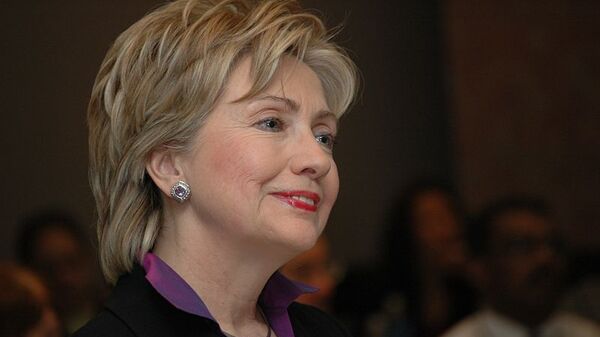NEW DELHI. (RIA Novosti correspondent Yevgeny Bezeka) - U.S. Secretary of State Hillary Clinton came to the ASEAN Regional Forum on security in Phuket, Thailand, from India, where she proved herself as a brilliant diplomat.
It was her first visit to India as Washington's top diplomat.
She has assured the Indian authorities that the new U.S. administration will carry on cooperation with India in the spirit of George W. Bush, disregarding differences.
Clinton wisely spotlighted the priority objectives of the Indian government outlined in the policy speech by Prime Minister Manmohan Singh.
Her first symbolic move in India was the decision to stay at the Taj Mahal Palace & Tower in Mumbai, which Pakistani terrorists attacked in November 2008, killing many people and setting fire to the luxury hotel. However, it reopened after repairs in December and is now seen as the symbol of the Indian business's refusal to bow to terrorists.
Next Clinton had a meeting with Indian business leaders organized by local billionaire, Ratan Tata, chairman of the Tata Group, one of the largest conglomerate companies in India, and the owner of the Taj Mahal hotel. That was another wise decision, because India is proud of its rapid economic growth and views U.S. business as a major partner.
Hillary Clinton and Bollywood superstar Aamir Khan participated in an interactive session called "Education - Serving to Change Our World" held at St. Xavier's College in Mumbai, and the press virtually held on to her every word.
"I am here to see how U.S. and India can work for the common cause of education, which is the great equalizer and gateway to opportunities," Clinton said.
She also gave an interview to the Times Now television channel.
Upon arriving in New Delhi, the state secretary went to Gurgaon, a satellite town adjoining Delhi, where she addressed a conference on climate change, which India views as a major threat.
And lastly, Clinton visited the leading Indian Agricultural Research Institute, because agriculture is another key sphere for the Indian authorities. Some 60% of Indians work in agriculture, which accounts for as much as 30% of the country's GDP.
All other events looked insignificant against that background, and differences between the two countries appeared to be minor.
The upshot of the visit was the signing of agreements on technical cooperation (the launch of satellites with U.S.-made components by Indian carrier rockets), on cooperation in education, and on end user monitoring.
The end user verification agreement should enable the U.S. to monitor the end use of the arms and sensitive technologies sold to India and ensure that they are not diverted to other countries. It has removed the last obstacles to the sale of U.S. military technology to India.
The only hitch was the clause on the admission of U.S. inspectors to Indian military facilities. According to press reports, Washington has allowed India to dismantle the components in question for inspection at "neutral" sites.
While smiling at everyone and accepting compliments, Clinton stressed Washington's readiness to strengthen rapprochement with India, and smartly avoided difficult questions.
One of such difficulties was the statement on non-proliferation made at the G8 summit in L'Aquila, Italy, in early July, in which the G8 countries expressed their resolve not to supply uranium enrichment technology to non-signatories of the Non-Proliferation Treaty.
The list of non-signatories includes Pakistan, North Korea, and India. Although the Nuclear Suppliers Group (NSG) previously made an exception for it, India may now face new problems.
Many observers said the G8 statement on non-proliferation was a result of U.S. efforts to "tighten the screws" in this sphere despite the nuclear deal which India signed with the Bush administration last year.
India has refused to sign the Non-Proliferation Treaty, which it considers to be discriminating. If the recent U.S. efforts prove successful, India will have problems with developing its nuclear program.
Former Indian Foreign Minister Pranab Mukherjee, who was appointed finance minister last May, has assured the Indian parliament that they need not fear the initiatives of the new U.S. administration. However, the Indian authorities most likely expressed deep concern behind closed doors.
The issue was also discussed at a news conference after the signing of bilateral agreements. Clinton diplomatically assured the media that the United States was not against the transfer of uranium enrichment technologies to India.
"If it is done within the appropriate channels and carefully safeguarded, as it is in the case of India, that is appropriate," the secretary of state said.
This is the best way she could put it, no matter what she really thinks on the issue, especially after Prime Minister Manmohan Singh said that India had approved sites where American companies will build two nuclear power plants.
It is part of a civilian nuclear deal signed by the US and India last year.
So, Clinton's first visit to India as secretary of state was a brilliant success even though it has not settled ideological differences, which will yet affect bilateral relations. Apart from India's refusal to sign the NPT, these differences also include greenhouse gas emission, liberalization of international trade, the fight against terrorism, and the legal status of American companies that will build nuclear power plants.
But these differences will not stop U.S.-Indian movement toward each other, which began nearly a decade ago, largely thanks to Hillary Clinton's talent for telling people what they want to hear.
The opinions expressed in this article are the author's and do not necessarily represent those of RIA Novosti.

